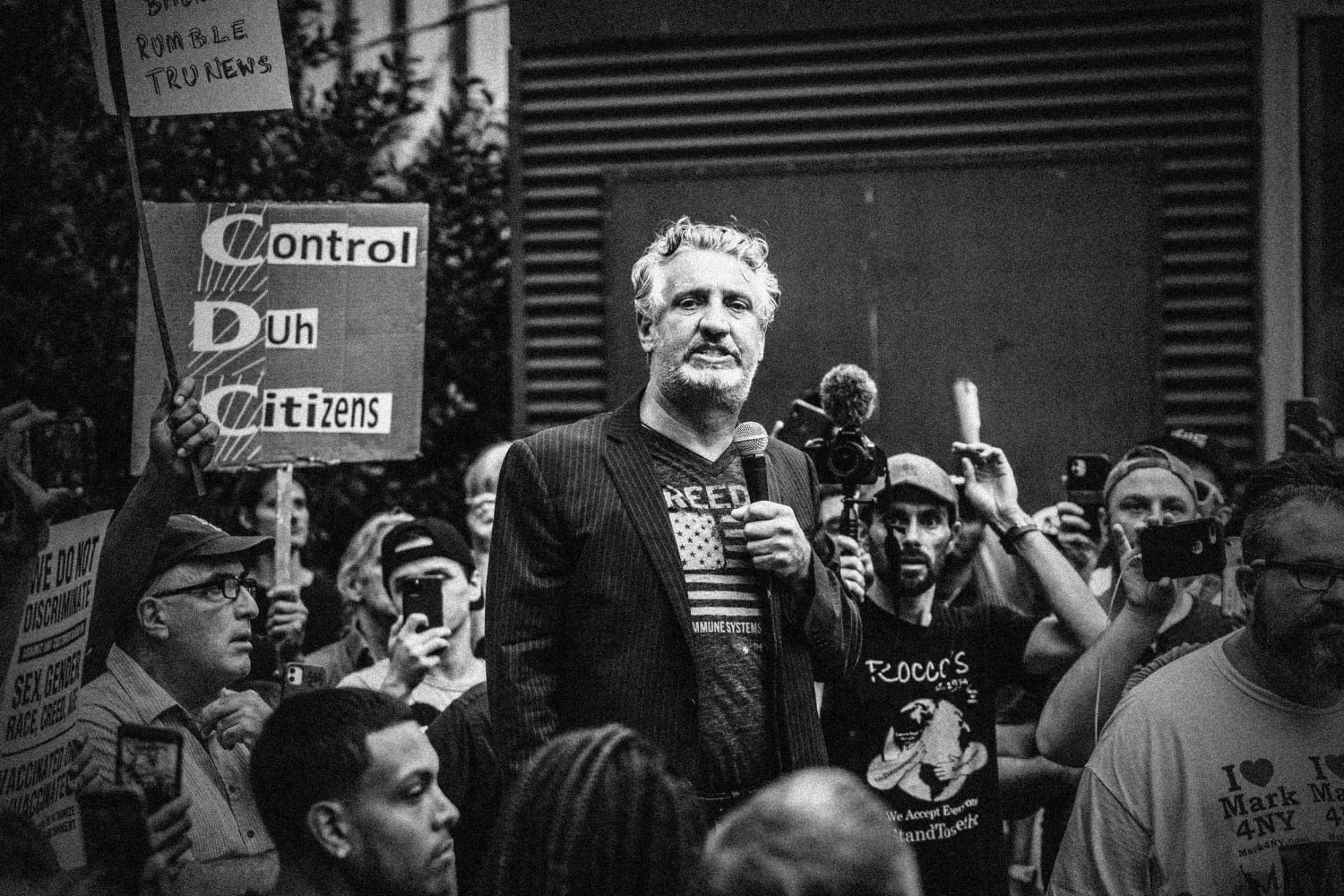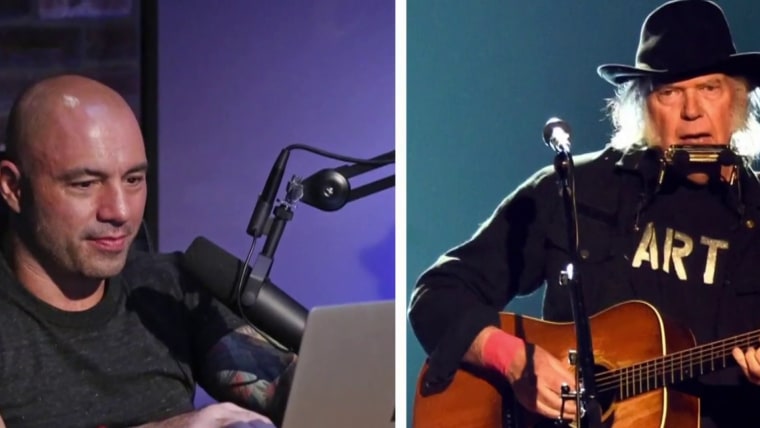Del Bigtree ended his closing speech at last week’s anti-vaccine mandate rally in Washington with a message, bellowed to a few thousand rallygoers and the news organizations assembled on a riser in front of him.
“We are no longer a fringe group,” he proclaimed.
The pandemic has been a boon for the anti-vaccine community, with Bigtree’s Informed Consent Action Network (ICAN), one of the country’s best-funded anti-vaccine organizations, among the biggest beneficiaries, according to newly filed tax records.
ICAN reported $5.5 million in revenue in 2020, a 60 percent increase over the previous year. The funding underscores how lucrative the pandemic has been for a handful of groups that spread health misinformation and undermine public faith in vaccines. Those donations primarily come from private donors, including through Facebook fundraisers.
Other large anti-vaccine organizations have similarly thrived during the pandemic. As an Associated Press investigation reported, the Children’s Health Defense, led by Robert F. Kennedy Jr., more than doubled its revenue in 2020, to $6.8 million.
While misinformation researchers know that the pandemic has boosted the profiles of many anti-vaccination efforts, the ICAN documents show how these organizations have also benefited financially.
ICAN has been a juggernaut since its formation in 2016. Led by Bigtree, a former television producer and anti-vaccine propaganda filmmaker, the nonprofit group initially made a name for itself filing Freedom of Information Act lawsuits against federal health agencies in an apparent unfulfilled quest to find and report secret scientific evidence that might disprove the safety of vaccines or prove long-discredited theories that vaccines cause harm, including autism.
ICAN, which provided the tax filings to NBC News, did not return a request for comment.
Fueled by claims that the scientific community, the pharmaceutical industry and media organizations are conspiring to withhold these so-called dangers about vaccines, ICAN launched its internet show, “The HighWire,” in 2017. The show, hosted by Bigtree, featured a rotating cast of the major figures in the anti-vaccination movement.
In 2020, the program pivoted almost exclusively to Covid content. Bigtree says the program attracts 6 million viewers per episode, a figure which ICAN did not provide evidence for and NBC News could not confirm. According to data from Similarweb, a digital analytics tool, The Highwire’s website is among the most popular “alternative and natural medicine sites” in the world, and reaches just over 1 million visits per month.
According to tax filings, ICAN paid Bigtree $146,000 in 2017. By 2020, it was paying him $221,000. Bigtree is also paid for speaking engagements. ICAN’s website describes him as “one of the most sought-after public speakers in the natural health arena, often gathering audiences in the thousands who travel from around the world to be inspired by his unique blend of passion, wit, and scientific expertise.” A 2020 Canadian Broadcasting Corporation investigation reported that Bigtree charged $3,000 per appearance, not including airfare and hotel.
“It’s worth it these days,” his manager told an undercover CBC reporter. “He’s pretty in demand.”
In an emailed response to NBC News, Bigtree said he doesn’t charge a speaking fee for unticketed events like rallies at state capitals.
As in previous years, the bulk of ICAN’s expenditures went to Siri & Glimstad, a New York law firm that has advertised its services challenging vaccine mandates on anti-vaccine groups’ websites. ICAN paid $2.1 million to Siri & Glimstad in 2020, according to the tax filings.
The money
While ICAN had nearly doubled in size and revenue each year, according to its available tax records, its success wasn’t assured. At the end of 2019, the organization — and the anti-vaccine movement itself — faced a new set of challenges.
New York philanthropists Bernard and Lisa Selz, who had provided the bulk of ICAN’s funding (around $3 million from 2016 to 2019, according to Selz Foundation tax records) appeared to halt donations in 2019 after The Washington Post reported on their contributions to anti-vaccine organizations.
In 2019, a $2.4 million donation — 70 percent of ICAN’s total revenue that year — came from a donor-advised fund, a kind of philanthropic middleman, sometimes used by donors as a means of anonymizing their donation.
The Selzs did not return a request for comment, and there is no public evidence that links them to these donations. Bigtree said in an email that ICAN relies on “several very generous donors,” but declined to comment on their identities, saying donors are “protected by law.”
The largest listed donations in ICAN’s 2020 tax filings are two gifts of $150,000. ICAN redacted the donors’ names.
During the pandemic, ICAN seems to have shifted its fundraising model.
Unlike its contemporaries in the anti-vaccination media, the HighWire doesn’t have advertisers, and there is no evidence of Bigtree selling supplements or other products common in the natural health world. Instead, ICAN relies on individual supporters. Episodes of the HighWire are punctuated with pleas for donations from Bigtree. In November, ICAN launched a fundraiser asking for donors to contribute $100 to $500 for personalized bricks that would pave a road from ICAN’s headquarters to the HighWire’s studio, both in Austin, Texas.
“That sponsor was you,” he said in one promotional video.
More than 1,000 bricks were sold, according to ICAN’s creative director, Patrick Layton, who reported the sales in an update posted to Facebook.
A portion of those donations still come via Facebook. The platform hosts fundraisers for ICAN, which brought in $13,500 in 2020 and at least $23,000 in 2021, according to an NBC News analysis of the Facebook campaigns. Facebook did not respond to a request for comment.
ICAN also received $165,000 in federal loans from the Paycheck Protection Program in May 2020. In its application, it said the money would be used for employee salaries.
Bigtree said in an email that the government had “forgiven the loan in full.”
“The federal loan definitely came at a critical time. We might not have made it without the government’s support,” he said.
The message
ICAN faced an additional hurdle in 2019 following a measles outbreak in Samoa that killed 83 people (mostly children) and a series of regional outbreaks in the U.S. After those outbreaks, the social media platforms that anti-vaccine groups depended on to spread their messages and attract new followers began to clamp down on misinformation, disallowing ads and throttling their pages’ reach.
Without funding and with their platforms in jeopardy, at the very moment when the future of ICAN seemed most unsure, the pandemic struck.
At various points during the pandemic, Bigtree has spread a variety of misleading or entirely false claims, including that mask wearing is dangerous but Covid is not, and that people should rise up against the government, break quarantine, willingly infect themselves and then use treatments that have not been proven effective against Covid-19.
When presented with these claims, Bigtree disputed the conclusion that he or ICAN spread misinformation.
ICAN tapped into a new online audience with the messages, according to Renée DiResta, research manager at the Stanford Internet Observatory, who tracked the growth of anti-vaccine groups during the pandemic, and called it “their moment.”
YouTube was the first to act, removing seven of Bigtree’s videos under its Covid misinformation policy last summer including “MASKS ARE A JOKE,” and “WE NEED TO CATCH THAT COLD!” By August 2020, ICAN’s channel, which had 250,000 subscribers, was terminated completely.
Facebook removed The HighWire’s 360,000-follower page in November 2020, citing repeated violations of its policy against misinformation that can cause physical harm. In February 2021, Facebook removed The Highwire’s Instagram account, which had more than 200,000 followers.
The loss was enormous, according to ICAN, which responded by suing both companies in federal court, claiming the platforms were “state actors” and that content moderation violated the nonprofit group’s freedom of speech.
“It is losing its ability to reach billions of potential viewers,“ the complaint stated. The platforms “severely curtailed ICAN’s ability to reach its followers and raise funds to carry out its charitable mission.” A federal judge rejected ICAN’s claims and dismissed the case last week, concluding that Facebook and YouTube are not government actors.
Despite ICAN’s claims in court filings, Bigtree contends that the pandemic has been good for business. In his speech at January’s anti-vaccine rally, before leading the Washington crowd in chants of “freedom,” Bigtree said, “My audience is now bigger than yours and it’s growing everyday.”
Source: | This article originally belongs to Nbcnews.com












